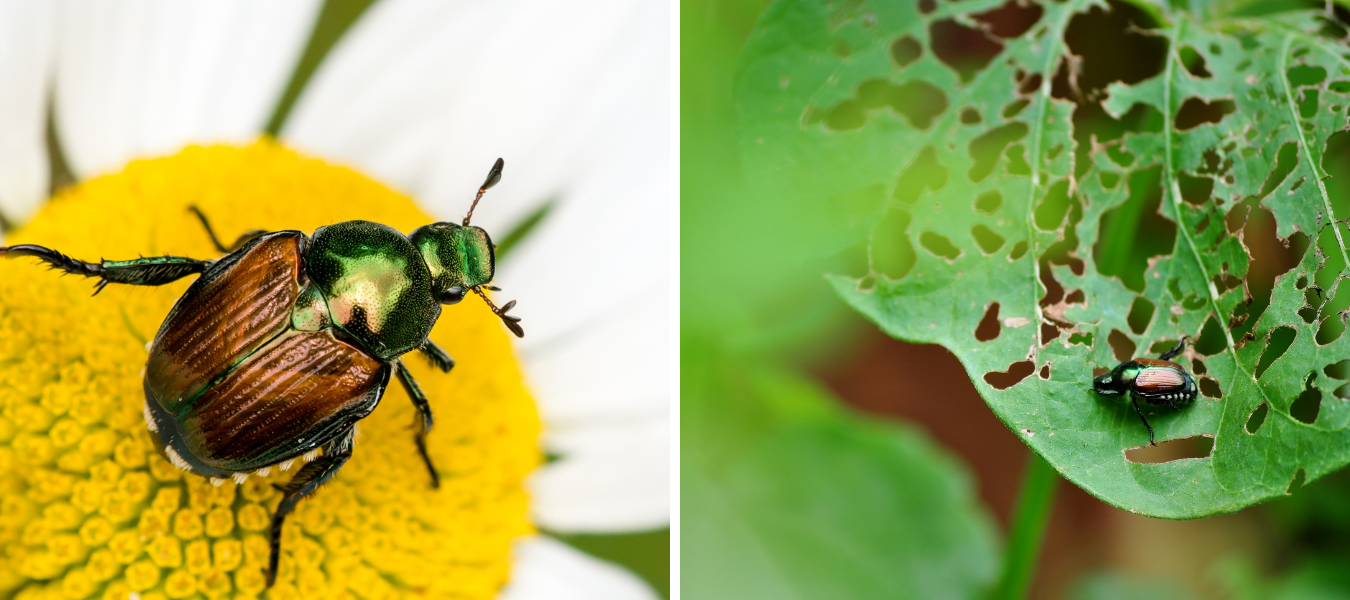Insect Control Treatments for Japanese Beetles
The Japanese Beetle can completely defoliate a tree. In doing so, the tree is at risk because it no longer has a full crop of leaves to absorb sun to gain energy, which can cause the tree to weaken and die over time.
Japanese Beetles are destructive insects, emerging from the ground as full grown adults for a 6 to 8 week period beginning around late June.
Each beetle can live for 30 to 45 days creating more and more damage as they feed.
Although the Linden is the Japanese Beetle’s favorite meal, White Birch, Purple Plum, Maple and certain Crab Apples are also frequented. A wide variety of shrubs and roses will also sustain heavy damage. On trees, they only eat the tissue between the veins of the leaf creating a skeletonized appearance as shown in the photo. Once damaged, the leaves begin falling to the ground.
Just before their life cycle ends, each female lays dozens of eggs in our lawns. The grubs that hatch from these eggs feed on grass roots until the cold Fall weather drives them deep into the soil below the frost line. As the soil warms the following spring, they resume feeding on grass roots. The grubs pupate in the soil and begin emerging in late June as full grown adults repeating the process.

TREATMENT
Tree Green applies two or three spray applications to limit damage done by the Japanese Beetle. Although the beetle begins emerging in late June, we wait until higher concentrations begin emerging. We do this because the efficacy of the sprays only last 10 to 14 days. Since the beetles continue to emerge over 6 to 8 weeks and live 30 to 45 days, we find we can limit the damage using this approach.
The video demonstrates a Tree Green specialist applying a spray application. Both Craig and Jenn explain further information about the Japanese Beetle as well as successful treatment for your valuable trees and shrubs.
COMPARISON OF PRODUCTS
Contact insecticides: Insecticides that kill on contact are sometimes used by homeowners or other companies. When using a ‘contact’ insecticide, only the beetles presently on the plant, who are hit with the spray, or those feeding over the next few days, will die. Contact insecticides usually have a short residual effect of 2 to 3 days.
Systemic insecticides: We opt to use ‘systemic’ insecticides. Top quality systemic insecticides (which soak into the leaf tissue and work once ingested) last 10 to 14 days. Therefore, many more beetles are killed during that time frame. Tests show that with our product of choice, Japanese Beetles will feed for 20 to 30 minutes before they stop feeding and then die within 8 to 24 hours.
No matter which type of systemic product is used, the beetles have to feed to ingest the product. Feeding for 20 to 30 minutes is obviously much better than having them feed for 30 to 45 days…but again, some damage still occurs.
We highly recommend treating against Japanese Beetles and limiting the damage they do!
If grub control is used on the lawn, then Japanese Beetles won’t be an issue, right?
UNFORTUNATELY, NO. A flying Japanese Beetle adult can ‘smell’ a target plant from miles away. If Japanese Beetles were present last year, they will be present again this year and most likely in a heavier concentration, as their numbers seem to increase yearly once established in an area.

